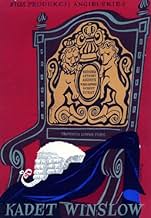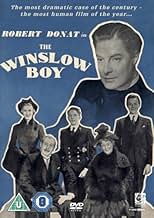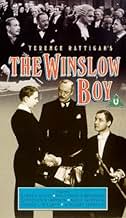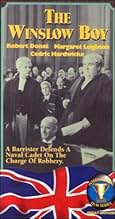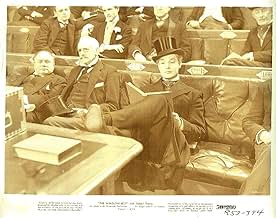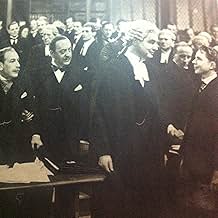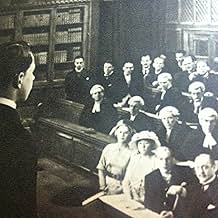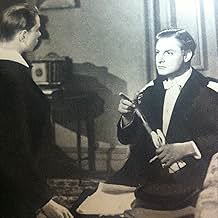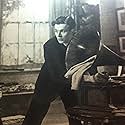VALUTAZIONE IMDb
7,6/10
1988
LA TUA VALUTAZIONE
Aggiungi una trama nella tua linguaIn pre-WWI England, a youngster is expelled from a naval academy over a petty theft, and his parents raise a political furor by demanding a trial.In pre-WWI England, a youngster is expelled from a naval academy over a petty theft, and his parents raise a political furor by demanding a trial.In pre-WWI England, a youngster is expelled from a naval academy over a petty theft, and his parents raise a political furor by demanding a trial.
- Regia
- Sceneggiatura
- Star
- Nominato ai 1 BAFTA Award
- 1 vittoria e 2 candidature totali
Cedric Hardwicke
- Arthur Winslow
- (as Sir Cedric Hardwicke)
Recensioni in evidenza
Terence Rattigan, once the toast of London's West End, fell very much out of favor when a new generation of playwrights made his plays seem antiquated and irrelevant. It took David Mamet's excellent filming of the "Winslow Boy" to remind us, that at his best, Rattigan was an exceptionally fine dramatist. Having much enjoyed the movie, I was curious to see the 1948 version directed by Anthony Asquith, who worked on a number of occasions with Rattigan.
It's an exceptional film from all accounts. Asquith's adaptations of theater works for the screen are excellent. Without opening them out too extensively they manage to avoid being stage bound, (Pygmalion, Browning Version, Importance of Being Earnest).
Being already familiar with the storyline, I simply sat back and savored the wonderful performances, and what performances they are. Cedric Hardwicke as the father lacks the softness of Nigel Hawthorne's portrayal and yet that's what precisely makes it ultimately more moving. Robert Donat overflows with charisma and Margaret Leighton plays her very first screen appearance with much intelligence and total aplomb.
The best of British
It's an exceptional film from all accounts. Asquith's adaptations of theater works for the screen are excellent. Without opening them out too extensively they manage to avoid being stage bound, (Pygmalion, Browning Version, Importance of Being Earnest).
Being already familiar with the storyline, I simply sat back and savored the wonderful performances, and what performances they are. Cedric Hardwicke as the father lacks the softness of Nigel Hawthorne's portrayal and yet that's what precisely makes it ultimately more moving. Robert Donat overflows with charisma and Margaret Leighton plays her very first screen appearance with much intelligence and total aplomb.
The best of British
After watching the Terence Rattigan DVD collection (with most of the adaptations being from the 70s and 80s) when staying with family friends last year, Rattigan very quickly became one of my favourite playwrights and he still is. His dialogue is so intelligent, witty and meaty, his characterisation so dynamic, complex and real and the storytelling so beautifully constructed.
'The Winslow Boy' is along with 'The Browning Version' and 'Separate Tables' one of Rattigan's best, containing all of the above and also showing his gift of giving his principal characters an emotional and psychological complexity in a real life situation (if not quite as much as 'The Browning Version'). Was even more blown away by this 1948 film than with the wonderful 1951 adaptation of 'The Browning Version', only because it doesn't have anything that rings false compared with 'The Browning Version's' contrived optimism at the end.
Not only is, again from personal opinion, this 1948 film is the definitive version of 'The Winslow Boy', though it also has the excellent 1976 BBC adaptation with Alan Badel and Eric Porter and the version with Jeremy Northam (which needs to be re-watched but remember it having a lot of good merits) to compete with, but it is also one of the best adaptations of any of Rattigan's plays.
Rattigan's involvement himself with the screenplay has a lot to do with it. It is an incredibly faithful adaptation to the play, practically unscarred and largely untouched, remarkable for a work so text-bound. Fidelity doesn't always come as a good thing when adapted, if too faithful the essence of the work can be lost, here it's the fidelity that makes 'The Winslow Boy' so impressive. Is it talky? Yes it is. That is not the fault of the film. The play is talky. Rattigan in general is talky, but the dialogue itself and the themes that Rattigan touches upon are so amazing that to me this is a rare case of talky not being a bad thing. Rattigan manages to maintain the essence exactly of his own work while also opening up the action and extending it, which immediately gives a more cinematic feel and immediately avoids the potential issue of being too stagy.
Anthony Asquith directs as assuredly as ever, never undermining the intricacies of the events and the complex character dynamic and sharpening up the legal and social dramas and Rattigan's class and hypocrisy insights. 'The Winslow Boy' is a beautiful looking film, lovingly shot with sumptuous settings and costuming.
From start to finish, even when dialogue heavy, the story is riveting, with a much tighter pace than the BBC version, and so much is told and done and in a way where one doesn't miss any of it. The highlight in the play has always been the interrogation scene between Morton and Ronnie, that's the case here in this film as well, some of the cleverest dialogue delivered with nail-biting tension and wit. The characterisation and character dynamic is spot on, where one feels sorry for the right people, amused by the right people, inspired by the right people and grow to hate the right people. The main conflict is so easy to root for (done with real intelligence and meat and one really wants justice done as much as the characters do), and Catherine sums up Morton perfectly in describing him as a cold fish that you grow to admire.
You need good acting to complement all this. The acting is more than good all round, especially Robert Donat whose Morton is even more unforgettable than Alan Badel's and a brilliant performance in its own right (one of his best). More than up to his level are a moving Cedric Hardwicke, a charming and witty Margaret Leighton and Neil North's relatable Ronnie. It was easy to sympathise too with Basil Radford and learn to dislike Frank Lawton in John's eventual treatment of Catherine later on. Wilfred Hyde White makes a distinguished appearance as well.
One expecting a climactic courtroom scene without knowing the play will be disappointed that one finds out the verdict a different way, but that's also how the play ends and it rings just as true this way.
In summary, fantastic film and just as great an example of Rattigan at his best. 10/10 Bethany Cox
'The Winslow Boy' is along with 'The Browning Version' and 'Separate Tables' one of Rattigan's best, containing all of the above and also showing his gift of giving his principal characters an emotional and psychological complexity in a real life situation (if not quite as much as 'The Browning Version'). Was even more blown away by this 1948 film than with the wonderful 1951 adaptation of 'The Browning Version', only because it doesn't have anything that rings false compared with 'The Browning Version's' contrived optimism at the end.
Not only is, again from personal opinion, this 1948 film is the definitive version of 'The Winslow Boy', though it also has the excellent 1976 BBC adaptation with Alan Badel and Eric Porter and the version with Jeremy Northam (which needs to be re-watched but remember it having a lot of good merits) to compete with, but it is also one of the best adaptations of any of Rattigan's plays.
Rattigan's involvement himself with the screenplay has a lot to do with it. It is an incredibly faithful adaptation to the play, practically unscarred and largely untouched, remarkable for a work so text-bound. Fidelity doesn't always come as a good thing when adapted, if too faithful the essence of the work can be lost, here it's the fidelity that makes 'The Winslow Boy' so impressive. Is it talky? Yes it is. That is not the fault of the film. The play is talky. Rattigan in general is talky, but the dialogue itself and the themes that Rattigan touches upon are so amazing that to me this is a rare case of talky not being a bad thing. Rattigan manages to maintain the essence exactly of his own work while also opening up the action and extending it, which immediately gives a more cinematic feel and immediately avoids the potential issue of being too stagy.
Anthony Asquith directs as assuredly as ever, never undermining the intricacies of the events and the complex character dynamic and sharpening up the legal and social dramas and Rattigan's class and hypocrisy insights. 'The Winslow Boy' is a beautiful looking film, lovingly shot with sumptuous settings and costuming.
From start to finish, even when dialogue heavy, the story is riveting, with a much tighter pace than the BBC version, and so much is told and done and in a way where one doesn't miss any of it. The highlight in the play has always been the interrogation scene between Morton and Ronnie, that's the case here in this film as well, some of the cleverest dialogue delivered with nail-biting tension and wit. The characterisation and character dynamic is spot on, where one feels sorry for the right people, amused by the right people, inspired by the right people and grow to hate the right people. The main conflict is so easy to root for (done with real intelligence and meat and one really wants justice done as much as the characters do), and Catherine sums up Morton perfectly in describing him as a cold fish that you grow to admire.
You need good acting to complement all this. The acting is more than good all round, especially Robert Donat whose Morton is even more unforgettable than Alan Badel's and a brilliant performance in its own right (one of his best). More than up to his level are a moving Cedric Hardwicke, a charming and witty Margaret Leighton and Neil North's relatable Ronnie. It was easy to sympathise too with Basil Radford and learn to dislike Frank Lawton in John's eventual treatment of Catherine later on. Wilfred Hyde White makes a distinguished appearance as well.
One expecting a climactic courtroom scene without knowing the play will be disappointed that one finds out the verdict a different way, but that's also how the play ends and it rings just as true this way.
In summary, fantastic film and just as great an example of Rattigan at his best. 10/10 Bethany Cox
This is one of the greatest movies I have ever seen, and since I turn 92 next month, I have seen a fair number of movies. Robert Donat, one of England's greatest actors ever, embodies the true-life soul of Sir Robert Morton, a high-powered attorney, who sacrificed his success for principle. Sir Cedric Hardwicke as magnificent as the accused boy's beleaguered father. Margaret Leighton's chemistry with Donat is flawless. The dialogue by Terrence Rattigan is equally classic. There are also wonderful small bits by Stanley Holloway, Cyril Ritchard, and Ernest Thesinger. If you wish to see a classic English film, almost unknown in this country, rent this one, and you are in for a treat.
Incidentally, there is also a 1998 version of this movie starring Jeremy Northam and Ian McKellen. Although it does not approach the greatness of the original, it is a more than satisfactory homage, and well worth seeing in its own right --- AFTER you've treated yourself to Donat's classic performance.
Incidentally, there is also a 1998 version of this movie starring Jeremy Northam and Ian McKellen. Although it does not approach the greatness of the original, it is a more than satisfactory homage, and well worth seeing in its own right --- AFTER you've treated yourself to Donat's classic performance.
This film adaption of Terrence Rattigan's play The Winslow Boy is highlighted by Robert Donat's performance of celebrated English barrister, Sir Robert Morton. It's one of Donat's best performances although he's more Donat that Edward Carson on whom the character is actually based.
If you want to see a more accurate portrayal of Carson and by name than the Oscar Wilde film starring Peter Finch is what you have to look at. In that one James Mason plays Carson who was by all accounts one mean man to cross, but a brilliant advocate. In that film Carson is appearing for the prosecution and he's relentless.
In his own elegant way Donat is relentless also, but he's also one cold blooded fish. As he plays Morton, the part is perfect for one of Donat's antiseptic portrayals.
The story concerns young Ronald Winslow played by Neil North who is expelled from the Naval Academy for the theft of a postal money order of five shillings. I'm sure even back in the Edwardian days this would go down as a petty theft, but it involves the military, His Majesty's military which does not make mistakes as we know.
Half the film is devoted to just letting young Mr. North have his day in court. This isn't America, he has to get permission from the government just to be allowed to defend himself. That is something that North's father Cedric Hardwicke is determined to see he gets.
It costs the Winslow family considerable. Older brother Jack Watling is not allowed to finish Oxford, sister Margaret Leighton's fiancé Frank Lawton breaks up with her because of the notoriety and Hardwicke's health goes down hill.
The Winslow Boy is based on a true incident from back in the beginning of the last century and it has good performances all around. Cyril Ritchard and Stanley Holloway do a couple of music hall numbers to capture the spirit of the time and are welcome indeed.
Still The Winslow Boy is Robert Donat's show and a good show it is.
If you want to see a more accurate portrayal of Carson and by name than the Oscar Wilde film starring Peter Finch is what you have to look at. In that one James Mason plays Carson who was by all accounts one mean man to cross, but a brilliant advocate. In that film Carson is appearing for the prosecution and he's relentless.
In his own elegant way Donat is relentless also, but he's also one cold blooded fish. As he plays Morton, the part is perfect for one of Donat's antiseptic portrayals.
The story concerns young Ronald Winslow played by Neil North who is expelled from the Naval Academy for the theft of a postal money order of five shillings. I'm sure even back in the Edwardian days this would go down as a petty theft, but it involves the military, His Majesty's military which does not make mistakes as we know.
Half the film is devoted to just letting young Mr. North have his day in court. This isn't America, he has to get permission from the government just to be allowed to defend himself. That is something that North's father Cedric Hardwicke is determined to see he gets.
It costs the Winslow family considerable. Older brother Jack Watling is not allowed to finish Oxford, sister Margaret Leighton's fiancé Frank Lawton breaks up with her because of the notoriety and Hardwicke's health goes down hill.
The Winslow Boy is based on a true incident from back in the beginning of the last century and it has good performances all around. Cyril Ritchard and Stanley Holloway do a couple of music hall numbers to capture the spirit of the time and are welcome indeed.
Still The Winslow Boy is Robert Donat's show and a good show it is.
Arthur Winslow is the head of a respectable London family; however this threatens to change when his young son is expelled from military school for stealing a postal order worth 5 shillings. Winslow risks his wealth and his family to pursue justice for his son. However when the military court of appeal rejects him he has to appeal to the highest court in the land through MP Sir Morton.
Having seen a recent version of this play I was curious to see another and was glad when I spotted it coming onto television. The play itself is pretty stagy and because of this it doesn't suffer from being dated the 1948 production values are easily the equal of the 1998 version. The film here differs from the recent version in that it has much more of the legal wrangling onscreen and not off. This makes the film much better as it encompasses both the social battle of the Winslow's and the legal one.
Both are involving and gripping but I must admit that I wasn't as caught up in the social drama as much as I wanted to be, because I felt that any family who's main worry in life was that there son had been excluded from school needn't worry about much! The fact that the Winslow's were able to get the ear of an MP just made it more difficult for me to get into few people live in such high circles (even if they work in a bank!).
The cast are good. Hardwicke is good as Winslow but the real star of the piece is Donat as Sir Morton. He is very stiff but also has layers that he reveals as he goes as well as carrying the weight of the legal thrills. The majority of the cast are good in roles of varying sizes and no-one does a noticeably bad job. Some are slight stereotypes but not to the film's detriment.
Overall this is a very good film and is better than the modern version. It mixes drama with wit and romance to good effect and puts the legal drama and the social drama on the same level rather than letting one suffer to the other. It had the potential to feel slow but the drama keeps it interesting throughout.
Having seen a recent version of this play I was curious to see another and was glad when I spotted it coming onto television. The play itself is pretty stagy and because of this it doesn't suffer from being dated the 1948 production values are easily the equal of the 1998 version. The film here differs from the recent version in that it has much more of the legal wrangling onscreen and not off. This makes the film much better as it encompasses both the social battle of the Winslow's and the legal one.
Both are involving and gripping but I must admit that I wasn't as caught up in the social drama as much as I wanted to be, because I felt that any family who's main worry in life was that there son had been excluded from school needn't worry about much! The fact that the Winslow's were able to get the ear of an MP just made it more difficult for me to get into few people live in such high circles (even if they work in a bank!).
The cast are good. Hardwicke is good as Winslow but the real star of the piece is Donat as Sir Morton. He is very stiff but also has layers that he reveals as he goes as well as carrying the weight of the legal thrills. The majority of the cast are good in roles of varying sizes and no-one does a noticeably bad job. Some are slight stereotypes but not to the film's detriment.
Overall this is a very good film and is better than the modern version. It mixes drama with wit and romance to good effect and puts the legal drama and the social drama on the same level rather than letting one suffer to the other. It had the potential to feel slow but the drama keeps it interesting throughout.
Lo sapevi?
- QuizThis film is based on the real-life Royal Navy cadet George Archer-Shee (1895-1914), the alleged theft took place in 1908 and the trial in 1910. Archer-Shee was commissioned in the British Army in 1913 and was killed in WWI at the First Battle of Ypres on October 31, 1914.
- BlooperWhen the film opens, a suburban train is coming into a station. The locomotive is in the livery of LNER (London & North Eastern Railway). Arthur Winslow alights having told his travelling companions that he has just retired from Lloyds Bank. When he gets home he shows his wife a pocket watch the bank gave him to mark his retirement. It's dated 1912, but the LNER wasn't created until 1923.
- Citazioni
Sir Robert Morton: I wept today because right had been done.
Catherine Winslow: Not justice?
Sir Robert Morton: No, not justice, right. It's easy to do justice, very hard to do right.
- ConnessioniVersion of The Winslow Boy (1958)
I più visti
Accedi per valutare e creare un elenco di titoli salvati per ottenere consigli personalizzati
- How long is The Winslow Boy?Powered by Alexa
Dettagli
- Data di uscita
- Paese di origine
- Lingua
- Celebre anche come
- The Winslow Boy
- Luoghi delle riprese
- London Film Studios, Shepperton, Surrey, Inghilterra, Regno Unito(studio: produced at London Film Studios Shepperton, England)
- Aziende produttrici
- Vedi altri crediti dell’azienda su IMDbPro
- Tempo di esecuzione1 ora 57 minuti
- Colore
- Proporzioni
- 1.37 : 1
Contribuisci a questa pagina
Suggerisci una modifica o aggiungi i contenuti mancanti

Divario superiore
By what name was Tutto mi accusa (1948) officially released in Canada in English?
Rispondi
